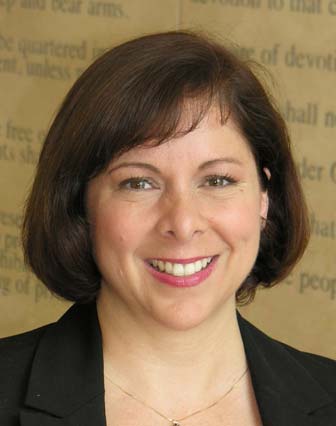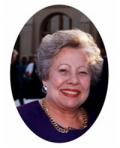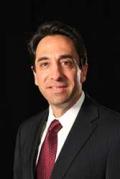
When the career counselor isn't working, she enjoys the Los Angeles Angels and Lakers. Suzanna claimed, "When I have spare time, I like to cook - my husband jokes that he's never had the same meal twice in all the years that we've been married." She continued to say that she recently has been taking ukulele lessons. Suzanna noted that she plays the oboe badly. She added, "Though I knew my oboe-playing was improving when the dog stopped howling during my practice sessions!"
Suzanna's favorite restaurant is The Cellar, a French cuisine restaurant based in Fullerton, CA. "It is literally in the basement of a historic building and was designed by the craftsmen who created the Pirates of the Caribbean ride at Disneyland. It is very Old World elegant with low lights, chandeliers, with waiters in tuxedoes. The environment really makes you feel like you're in another place and time."
When asked about her favorite book, she replied:
"I am one of those people who works her way through several books at the same time. One book that I'm in the middle of now is 'Beyond Talent,' by John C. Maxwell. I really enjoy his writing on leadership. It seems like I've dog-eared half of what I've read so far! This book focuses on how your belief in yourself really lifts your talent, but that you need initiative to activate it, and focus to direct it. Maxwell writes that '[y]ou will become on the outside what you believe in the inside.' I see that play out every day in my work. Students who are confident in their potential and have a sense of mission are able to overcome disappointments and keep moving forward towards their goals - and they reach them, despite the challenges of the current legal job market."Successful Assistant Dean of Career Services
Does Suzanna have a most memorable law school experience? She recalled:
"I remember when I was clerking for our local District Attorney's Office, I had the opportunity to write a number of motions. One day my supervisor asked if I would like to argue one of my motions in court. I jumped at the chance. The defense went first, and then when it was my turn, the judge announced that he was granting my motion before I even had the chance to argue it. It was an amazing feeling to realize that something that I had written had the power to move the court and to accomplish something good on behalf of the victim in the case. I really felt the sense of power and great privilege that my legal education was giving me and what opportunities I had ahead of me to help people with my training.Why did she decide to become a career counselor? Suzanna said:
"My former dean recruited me back to my alma mater law school. At that point in my career, I was still young in my practice of criminal defense and was enjoying my work, so I had not decided to stay in a practice or career services specifically, but it's always nice when someone calls you to talk about a job offer, so I took the meeting. I explained that I really was not sure that I wanted to make a change. But as he described what the work entailed, I realized that I was hearing myself in the job description. Every part of the job seemed to coincide with something that I enjoyed doing and felt was a strength of mine.What is the best part of Suzanna's job? She noted:
However, because I was still unsure that I wanted to leave practice, I accepted the job on a part-time interim basis. Once I was on the job, I fell in love with the work and have been there ever since. It has been incredibly fulfilling to have work that allows me to be exactly who I am, use my strengths, and do what I enjoy. This is the same satisfaction that I want our graduates to experience. We spend most of our waking hours at work, so if you're not doing something that you love and truly care about, that's how you're spending your life - not being yourself, and no amount of money can make up for that lack of satisfaction."
"The best part of my job is having the chance to help individual students recognize their unique talents, affirm and encourage them when they need it, and to feel that I have had some small part in helping them achieve their goals. Plus, I work with an amazing team of colleagues in career services who make every day fun for me, and where we provide support not only for students and alumni, but for each other."What does the assistant dean of career services have a knack for?
"I have a knack for building a team. I think I have been successful in bringing together a group of people with diverse personalities and strengths by sharing a vision that unifies and inspires the group and honors what each person has to contribute, and that allows each member of our team to work to his or her strengths."Suzanna was asked how the market has affected students' ability to obtain positions they want. She acknowledged:
"Though determined and hardworking grads eventually get to where they want to go, it takes longer to get there. So for example, because of government hiring freezes and budget cuts, the graduate who really wants to be a prosecutor, may have to go through multiple recruitment cycles before ultimately being hired because there are far fewer positions and fierce competition for the very limited number of positions that are available. Instead of landing that prosecutor job the year you graduate, it might be a year or year and a half later before you get the job, so graduates have to be prepared with a 'Plan B' to secure other types of meaningful work while they continue to pursue their ultimate career goals. Also, we see some graduates will be in the position of accepting part-time or temporary work to start and will use these stepping stone jobs to build their resumes and to develop relationships within the legal community that later lead to full-time, permanent positions."What does Suzanna do to prepare students who are entering the workforce in a downward economy? She stated:
"We are honest with students from the beginning, even before they are admitted, about the changes that are happening in the legal profession and the impact of these changes on legal recruitment. We want to provide as much information as possible so that students have realistic expectations coming into law school and that they understand it is critical to plan ahead and to use their time and resources well while they are in law school to position themselves for post-graduation employment. Our goal is to focus students on what they can control. None of us can control the job market, but students can control the quality of their application materials, their interviewing skills, and the relationships that they are building throughout their time with us.What advice would she give to students who are about to graduate and enter the workforce? Suzanna advised:
We provide a wide variety of training to help them build these skills, but the challenge for those of us in career services has always been in getting busy and stressed-out law students to consistently attend career services trainings and events. To ensure that students are getting the training that we know they need in this competitive job market, we have implemented a new Professional Development Program that is a graduation requirement. Though we will keep the strong doctrinal instruction that has allowed us to achieve a very high bar pass rate, and our emphasis on practice skills supplements but does not replace this part of our program, starting with this year's incoming class, our students are now required to complete a certain number of mandatory career services trainings throughout their time in law school, and they are also required to meet one-on-one with a career counselor at least once a semester so that we can track their progress and make sure that they are getting individualized support and guidance early on, which we know will enhance their ability to secure meaningful legal employment during law school and following graduation.
Our curriculum has also changed this year to place even more emphasis on practical skills training and also makes a certain amount of skills training required. From a career services perspective, I am very pleased with the change in the curriculum because graduates who have practical skills training increase their marketability. In addition, when students experience the externships, clinics, and skills courses that we have to offer, these classes help them to discover what they enjoy doing and what their strengths are earlier on. Students who know what they like and what they're good at are much more focused in their job search efforts and use their time and resources in law school more strategically. As a result, these students are typically more successful in securing post-graduate employment, and specifically in landing jobs they really want."
"Never give up on your dreams, but be willing to be flexible and creative in your job search. Just sending out resumes to jobs you find on Craigslist is not going to cut it. Getting a job is a job, and you need to identify your resources and have a plan of action, and then systematically implement your plan. Be open to part-time, temp, and volunteer work as these opportunities will build your resumes, demonstrate your work ethic and initiative to prospective employers, and may lead to more ideal permanent and full-time work. Be a contributor in your legal community; seek opportunities to lead and serve, and develop friendships. As you invest in the success of others, that investment will be returned to you."When asked what advice she would give to a student who is struggling with their coursework, Suzanna asserted:
"That really depends on the situation. I always advise students to speak with our Associate Dean of Administration and Student Services to let her know right away about what is going on so that she can offer options and support that might help a student get back on course before the student gets him- or herself into an even tougher spot. We also have an Academic Achievement Program that is specifically designed to help students who are struggling and need some extra attention and training to help them succeed. Sometimes there is a time management issue and a student may need guidance on how to prioritize or a student just needs some encouragement to use their professors' office hours or class tutors to get some extra help."What advice does Suzanna give to a student who doesn't know what career path to take after he/she graduates? She disclosed:
"We assure students that this is a very common dilemma and that it is a process to learn where their path lies. The first step towards finding your path is knowing who you are as a person and identifying what you value. We provide counseling and self-assessment resources to help students identify their strengths and personality styles that in turn will help us to direct them to explore practice areas and work environments that would mesh with their personality style and would be in line with their values.In regards to her strengths and one weakness as a college career counselor, Suzanna admitted:
Second, you discover your career path by being open to and pursuing new experiences. Every work experience that you have not only gives you transferrable skills, but gives you the opportunity to try out different work environments and see what it's really like in practice in a particular setting. Sometimes a job shows you what you don't want to do, and that's valuable, too. It's also important for students to know what sectors of the job market are hiring so that they can take that information into account as they are exploring their options. In addition, we ask students to think back over their past life and work experiences and recall experiences that they really enjoyed and found meaningful. We try to see if there is any pattern there or any indicators that shows us personality-wise what types of settings are a good fit for them."
"As a counselor, I am an empathetic listener, and I think that the students with whom I work feel that I truly care about them and am invested in their success - that means that I often am talking to and meeting with students and alumni after hours and on weekends. As is the case with most people, my greatest strength is also my greatest weakness in that I find it challenging to set boundaries with my work hours, which can cause burnout."As the assistant dean of career services, what area of counseling is Suzanna most passionate about? "Helping students recognize their talents."
What motivated Suzanna to become a college career counselor? "I went to law school so that I could have a career where I could help people on a one-to-one basis. Being a career counselor gives me the opportunity to do that every day."
If she wasn't the Assistant Dean of Career Services at Chapman University, what would she most probably be doing? "I would be practicing law or marriage and family therapy."
Where does Suzanna see herself in five years time? "I still see myself engaged in work that is helping people. The counseling part of the job is very rewarding, but I have also enjoyed being an administrator and working on big picture issues within the law school. Related to those interests, some of the career options I think about are policy work, pubic administration, and integrative law practice."
Non-profit Organizations, The Downside of Her Position and Suzanna's Goals
Is Suzanna involved with any non-profit organizations? "I am involved with my local church and have been a pro bono attorney for the Public Law Center."
Is there a downside to her position? "Very long hours!"
Does the assistant dean of career services have goals? "To be a lifelong learner, to continue to take on new challenges, and to do work that makes people's lives better and that allows me to be the person I am."
Find Assistant Dean Law Admission job Openings on LawCrossing.





